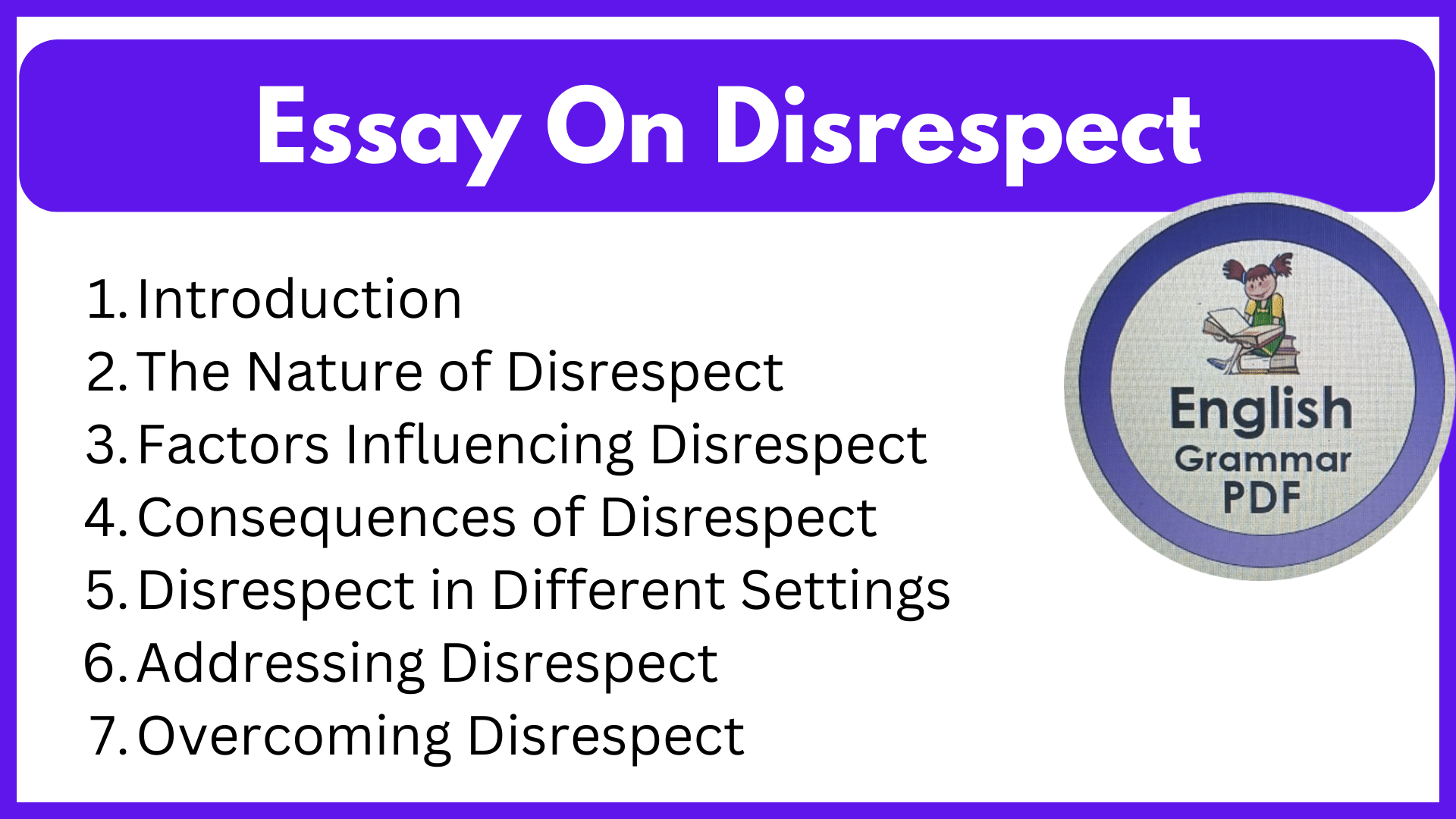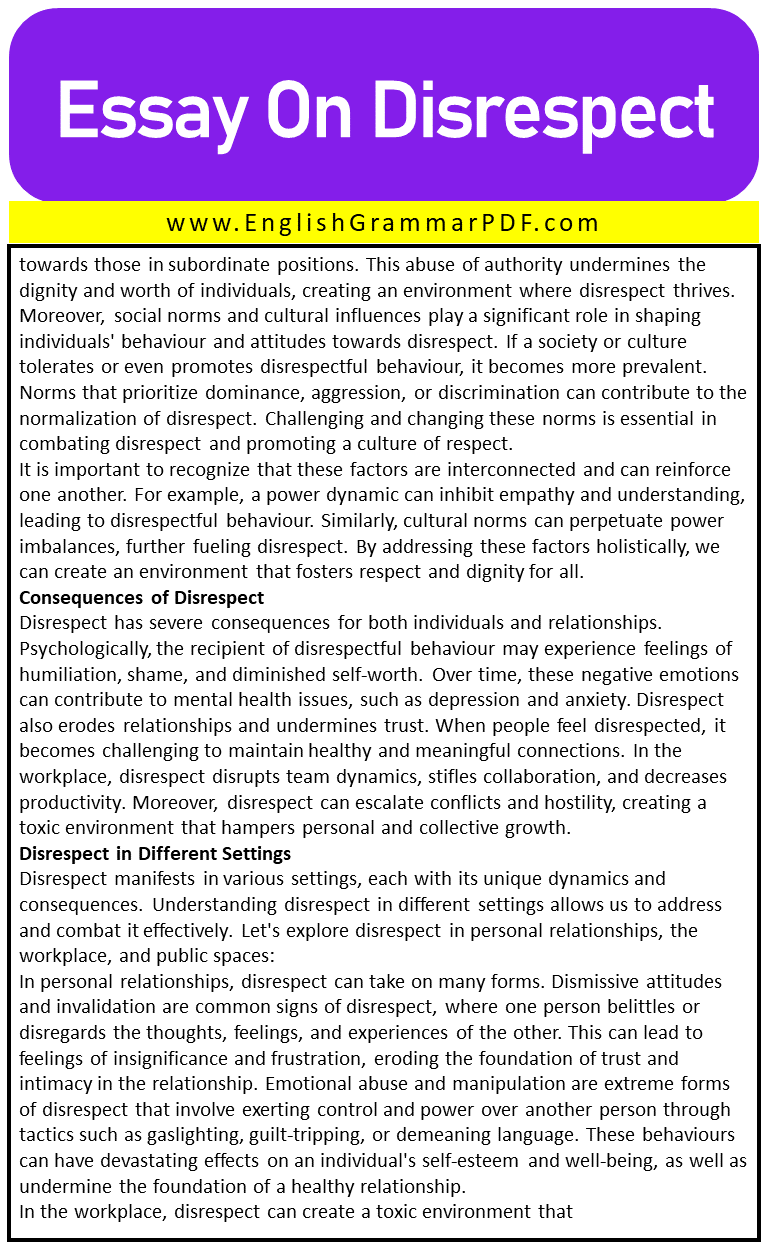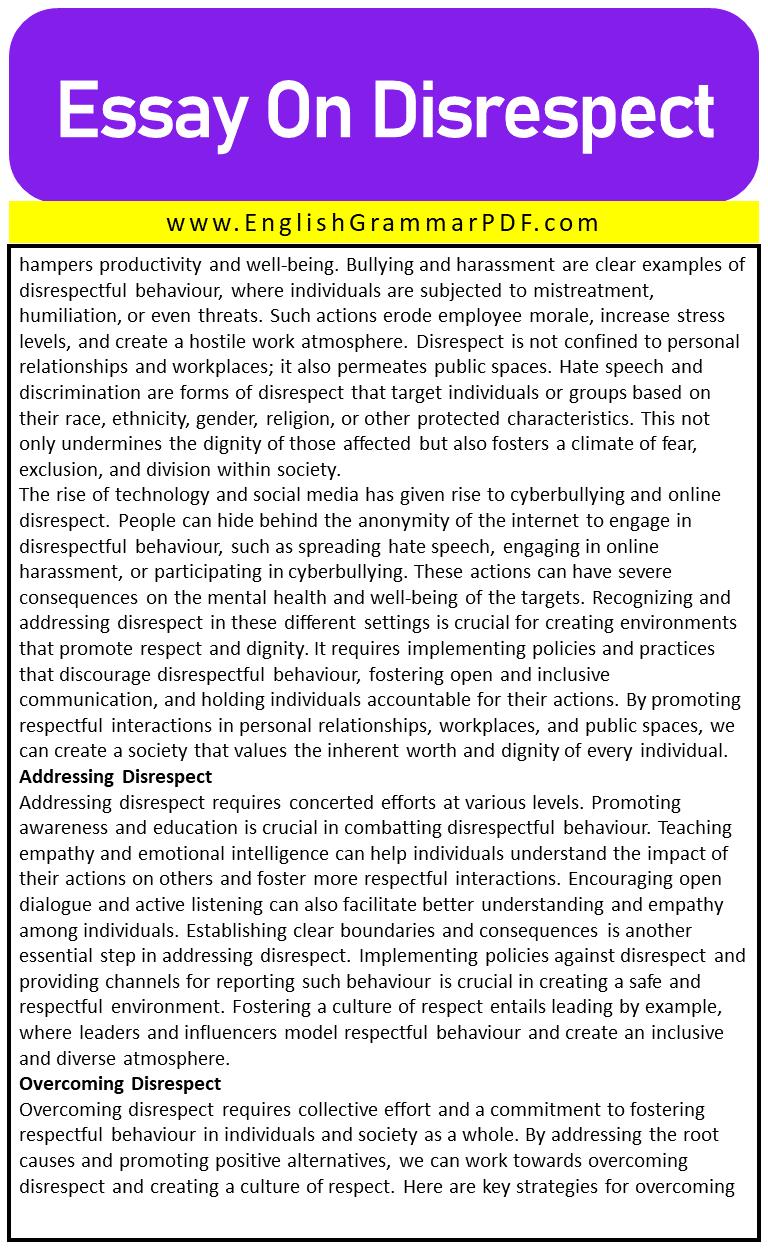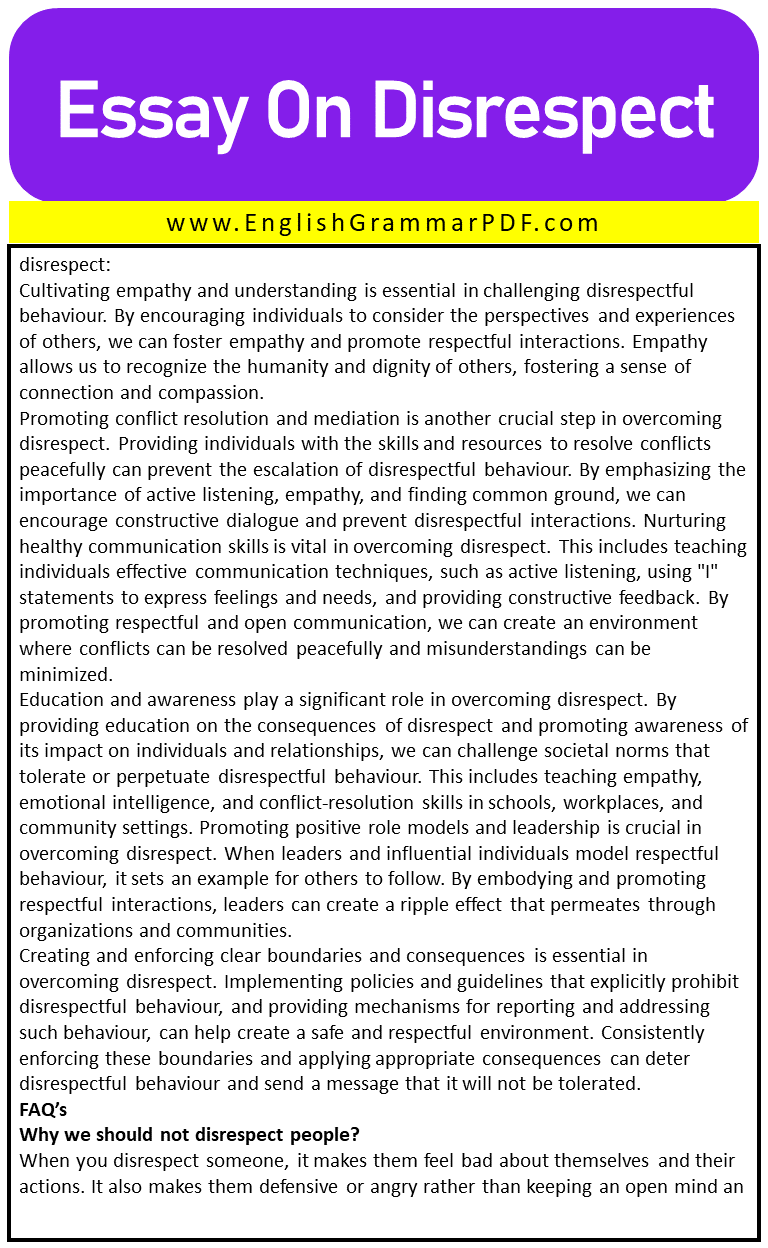Essay On Disrespect
Outline of Essay:
- Introduction
- The Nature of Disrespect
- Factors Influencing Disrespect
- Consequences of Disrespect
- Disrespect in Different Settings
- Addressing Disrespect
- Overcoming Disrespect
Introduction
Disrespect is a concept that encompasses various forms of behaviour that undermine the dignity and worth of individuals. In this essay, we will explore the nature of disrespect, its influence on individuals and relationships, and the consequences it brings. This essay aims to highlight the importance of addressing disrespect in society and to provide insights into how it can be addressed.
The Nature of Disrespect
Disrespect manifests in both verbal and non-verbal behaviour. It can take the form of derogatory language, insults, belittlement, or dismissive gestures. Examples of disrespectful behaviour can be observed in personal, professional, and societal contexts. In personal relationships, disrespect may be evident through dismissive attitudes, invalidation of feelings, or even emotional abuse and manipulation. In the workplace, disrespect can be seen in bullying, harassment, a lack of professionalism, and a disregard for courtesy. Disrespect also pervades public spaces, where hate speech, discrimination, cyberbullying, and online disrespect are prevalent. Such behaviours have a significant impact on individuals and relationships.
Factors Influencing Disrespect
Disrespect is influenced by various factors that contribute to its manifestation in personal, professional, and societal contexts. Understanding these factors is crucial in addressing and combatting disrespectful behaviour effectively. Several key factors play a role in influencing disrespect:
Firstly, a lack of empathy and understanding is a significant factor that contributes to disrespect. When individuals fail to empathize with others and understand their perspectives, they are more likely to engage in disrespectful behaviour. Empathy involves putting oneself in someone else’s shoes and recognizing their emotions and experiences. Without empathy, it becomes challenging to respect and appreciate the dignity of others, leading to disrespectful interactions.
Secondly, power dynamics and hierarchical structures can foster disrespect. In situations where there is an unequal distribution of power, individuals in positions of authority may abuse their power and engage in disrespectful behaviour towards those in subordinate positions. This abuse of authority undermines the dignity and worth of individuals, creating an environment where disrespect thrives.
Moreover, social norms and cultural influences play a significant role in shaping individuals’ behaviour and attitudes towards disrespect. If a society or culture tolerates or even promotes disrespectful behaviour, it becomes more prevalent. Norms that prioritize dominance, aggression, or discrimination can contribute to the normalization of disrespect. Challenging and changing these norms is essential in combating disrespect and promoting a culture of respect.
It is important to recognize that these factors are interconnected and can reinforce one another. For example, a power dynamic can inhibit empathy and understanding, leading to disrespectful behaviour. Similarly, cultural norms can perpetuate power imbalances, further fueling disrespect. By addressing these factors holistically, we can create an environment that fosters respect and dignity for all.
Consequences of Disrespect
Disrespect has severe consequences for both individuals and relationships. Psychologically, the recipient of disrespectful behaviour may experience feelings of humiliation, shame, and diminished self-worth. Over time, these negative emotions can contribute to mental health issues, such as depression and anxiety. Disrespect also erodes relationships and undermines trust. When people feel disrespected, it becomes challenging to maintain healthy and meaningful connections. In the workplace, disrespect disrupts team dynamics, stifles collaboration, and decreases productivity. Moreover, disrespect can escalate conflicts and hostility, creating a toxic environment that hampers personal and collective growth.
Disrespect in Different Settings
Disrespect manifests in various settings, each with its unique dynamics and consequences. Understanding disrespect in different settings allows us to address and combat it effectively. Let’s explore disrespect in personal relationships, the workplace, and public spaces:
In personal relationships, disrespect can take on many forms. Dismissive attitudes and invalidation are common signs of disrespect, where one person belittles or disregards the thoughts, feelings, and experiences of the other. This can lead to feelings of insignificance and frustration, eroding the foundation of trust and intimacy in the relationship. Emotional abuse and manipulation are extreme forms of disrespect that involve exerting control and power over another person through tactics such as gaslighting, guilt-tripping, or demeaning language. These behaviours can have devastating effects on an individual’s self-esteem and well-being, as well as undermine the foundation of a healthy relationship.
In the workplace, disrespect can create a toxic environment that hampers productivity and well-being. Bullying and harassment are clear examples of disrespectful behaviour, where individuals are subjected to mistreatment, humiliation, or even threats. Such actions erode employee morale, increase stress levels, and create a hostile work atmosphere. Disrespect is not confined to personal relationships and workplaces; it also permeates public spaces. Hate speech and discrimination are forms of disrespect that target individuals or groups based on their race, ethnicity, gender, religion, or other protected characteristics. This not only undermines the dignity of those affected but also fosters a climate of fear, exclusion, and division within society.
The rise of technology and social media has given rise to cyberbullying and online disrespect. People can hide behind the anonymity of the internet to engage in disrespectful behaviour, such as spreading hate speech, engaging in online harassment, or participating in cyberbullying. These actions can have severe consequences on the mental health and well-being of the targets. Recognizing and addressing disrespect in these different settings is crucial for creating environments that promote respect and dignity. It requires implementing policies and practices that discourage disrespectful behaviour, fostering open and inclusive communication, and holding individuals accountable for their actions. By promoting respectful interactions in personal relationships, workplaces, and public spaces, we can create a society that values the inherent worth and dignity of every individual.
Addressing Disrespect
Addressing disrespect requires concerted efforts at various levels. Promoting awareness and education is crucial in combatting disrespectful behaviour. Teaching empathy and emotional intelligence can help individuals understand the impact of their actions on others and foster more respectful interactions. Encouraging open dialogue and active listening can also facilitate better understanding and empathy among individuals. Establishing clear boundaries and consequences is another essential step in addressing disrespect. Implementing policies against disrespect and providing channels for reporting such behaviour is crucial in creating a safe and respectful environment. Fostering a culture of respect entails leading by example, where leaders and influencers model respectful behaviour and create an inclusive and diverse atmosphere.
Overcoming Disrespect
Overcoming disrespect requires collective effort and a commitment to fostering respectful behaviour in individuals and society as a whole. By addressing the root causes and promoting positive alternatives, we can work towards overcoming disrespect and creating a culture of respect. Here are key strategies for overcoming disrespect:
Cultivating empathy and understanding is essential in challenging disrespectful behaviour. By encouraging individuals to consider the perspectives and experiences of others, we can foster empathy and promote respectful interactions. Empathy allows us to recognize the humanity and dignity of others, fostering a sense of connection and compassion.
Promoting conflict resolution and mediation is another crucial step in overcoming disrespect. Providing individuals with the skills and resources to resolve conflicts peacefully can prevent the escalation of disrespectful behaviour. By emphasizing the importance of active listening, empathy, and finding common ground, we can encourage constructive dialogue and prevent disrespectful interactions. Nurturing healthy communication skills is vital in overcoming disrespect. This includes teaching individuals effective communication techniques, such as active listening, using “I” statements to express feelings and needs, and providing constructive feedback. By promoting respectful and open communication, we can create an environment where conflicts can be resolved peacefully and misunderstandings can be minimized.
Education and awareness play a significant role in overcoming disrespect. By providing education on the consequences of disrespect and promoting awareness of its impact on individuals and relationships, we can challenge societal norms that tolerate or perpetuate disrespectful behaviour. This includes teaching empathy, emotional intelligence, and conflict-resolution skills in schools, workplaces, and community settings. Promoting positive role models and leadership is crucial in overcoming disrespect. When leaders and influential individuals model respectful behaviour, it sets an example for others to follow. By embodying and promoting respectful interactions, leaders can create a ripple effect that permeates through organizations and communities.
Creating and enforcing clear boundaries and consequences is essential in overcoming disrespect. Implementing policies and guidelines that explicitly prohibit disrespectful behaviour, and providing mechanisms for reporting and addressing such behaviour, can help create a safe and respectful environment. Consistently enforcing these boundaries and applying appropriate consequences can deter disrespectful behaviour and send a message that it will not be tolerated.
FAQ’s
Why we should not disrespect people?
When you disrespect someone, it makes them feel bad about themselves and their actions. It also makes them defensive or angry rather than keeping an open mind and willing to listen to what you’ve to say. Respecting someone doesn’t mean agreeing with them or even liking them.
Is disrespect an attitude?
Disrespect means to have little or no respect for something or someone. Disrespect can be displayed, not only by the way that you talk to someone or treat someone but also by your attitude and actions towards someone.
Explore More Essays:
Download the PDF of the Essay:







